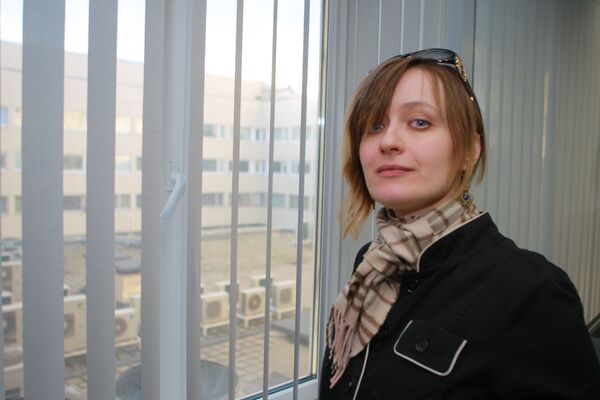Director Pavel Kostomarov is such a sweet, soft-spoken man that it’s sometimes hard to imagine how he manages to make hard-hitting films. And it’s even harder to imagine that officials from the Investigative Committee would search his apartment at seven a.m. one winter morning.
Yet that is precisely what happened last Friday, leading to Pavel, who is the father of two small children on top of being a generally lovely guy, suddenly becoming front page news. Even PM Dmitry Medvedev has commented on his case, after being prompted by Pavel’s producer, Alexei Pivovarov, on live TV.
Pavel is an award-winning documentary filmmaker and one of the co-founders of “The Term,” an online project that documents the Russian opposition – and current events generally. The Investigative Committee, a sort of Russian FBI, was interested in his videos of the May 6 violence on Bolotnaya Ploshchad, and has officially labeled Pavel a witness in the case.
The criminal investigation into what happened that day has long since become a cause célèbre. One person has already been handed a four-year prison sentence for his involvement – in spite of going out of his way to admit his guilt and make amends.
On television, Medvedev expressed surprise that investigators would want to barge into Kostomarov’s apartment early in the morning – as opposed to, you know, just making an official request to turn over the video material.
But the incident is not that surprising when you consider the pomp and circumstance surrounding the investigation. The officials involved have two very obvious aims – show the people under investigation their place, and make their superiors proud. Heavy-handed tactics are not only part and parcel of their jobs – they also make for better headlines.
Yet lost in the usual anger at Medvedev’s response (it seems that some people would get furious if Medvedev pointed out that the sky is blue – or gray, depending on the cloud cover in Moscow) was the fact that the PM is certainly right about one thing: Russia’s “legal culture,” as he put it, is seriously lacking. And this is everyone’s problem. It is not confined to famous cases.
Law enforcement officials mistrust the public. The public distrusts law enforcement officials. Investigators think there’s something fishy about you if you’re out there filming street protests – a.k.a. doing your job – as opposed to working as a faceless cameraman for Channel One, or whatever. People, for their part, are conditioned to see any interaction with law enforcement as de facto intimidation. There is mutual disrespect, but there is also the fact that it is the officials that hold the reins of power over ordinary citizens – and they are not used to being held accountable when they don’t do their jobs well.
Of course, there is nothing illegal about searching someone’s apartment should you officially designate them a witness in an ongoing investigation. But in a country that has still not gotten over what happened in 1937 (indeed, in some of Russia’s more volatile regions, 1937 appears to remain in vogue, though this is not the case in Moscow), any high-profile search or detention causes both widespread agony and widespread glee.
People are either terrified and enraged when it happens – or they are cheering the officials on (lest the same officials later brand them as “disloyal”). This uncomfortable legacy is one of the main stumbling blocks toward genuine legal reform – and to basic understanding that one is a law-abiding citizen of one’s own country.
If you are always trying to beat the state at its own game, if you are always keeping one wary eye on the men in uniform for fear of what they might pull next, how can you have a legal culture to speak of?
The views expressed in this article are the author's and do not necessarily represent those of RIA Novosti.
Trendwatching in Russia is an extreme sport: if you’re not dodging champagne corks at weddings, you’re busy avoiding getting trampled by spike heels on public transportation. Thankfully, due to an amazing combination of masochism and bravado, I will do it for you while you read all about it from the safety of your living room.
Natalia Antonova is the deputy editor of The Moscow News. She also works as a playwright – her work has been featured at the Lyubimovka Festival in Moscow and Gogolfest in Kiev, Ukraine. She was borxn in Ukraine, but spent most of her life in the United States. She graduated from Duke University, where she majored in English and Slavic Literature. Before coming to Moscow, she worked in Dubai, UAE and Amman, Jordan. Her writing has been featured in The Guardian, Foreign Policy, Russia Profile, AlterNet, et al.
Trendwatcher: A Day in the Life of Tatyana Ivanova
Trendwatcher: The Boring Russians of Dubai
Trendwatcher: Destroying Football – for the Lulz
Trendwatcher: Lunching with the Enemy
Trendwatcher: The Moscow Grocery Shop of Horrors
Trendwatcher: Marrying Money - of Diamonds and Marital Rape
Trendwatcher: Modernizing Health Care – and Death Care
Trendwatcher: Is Dignity in Death Too Much to Ask?



